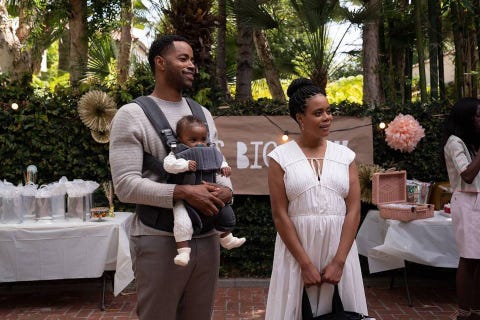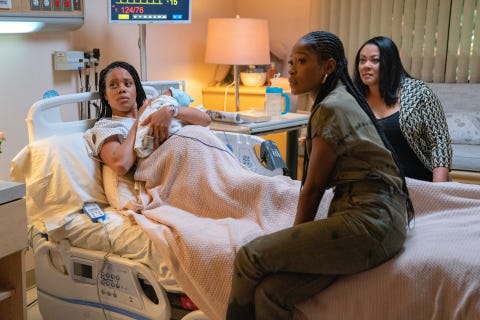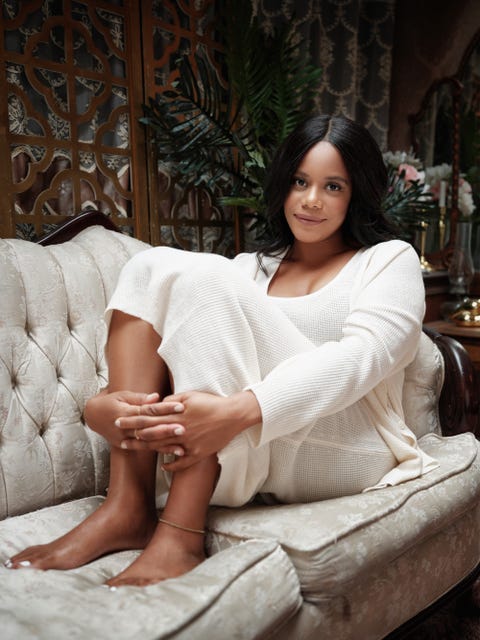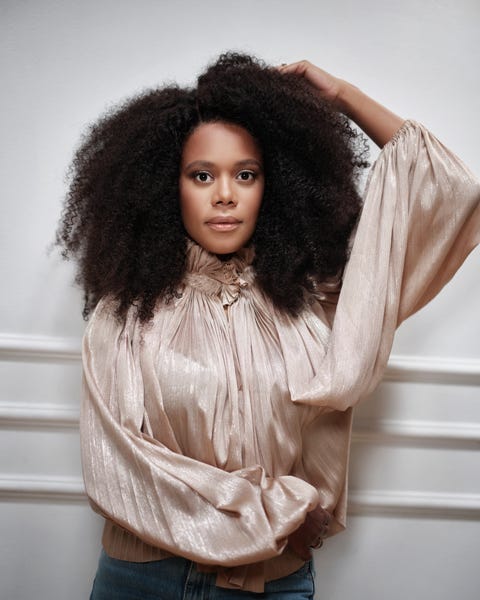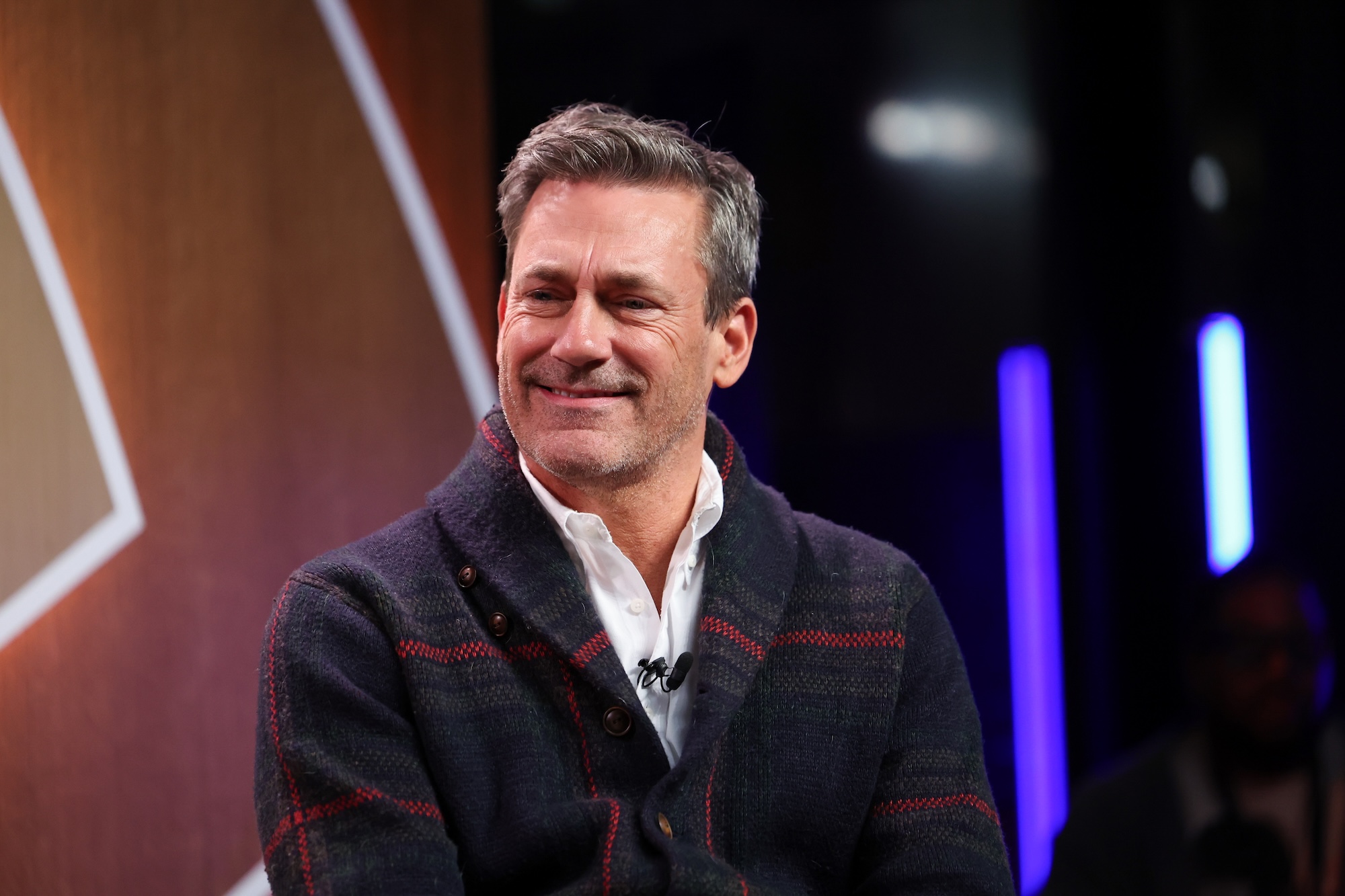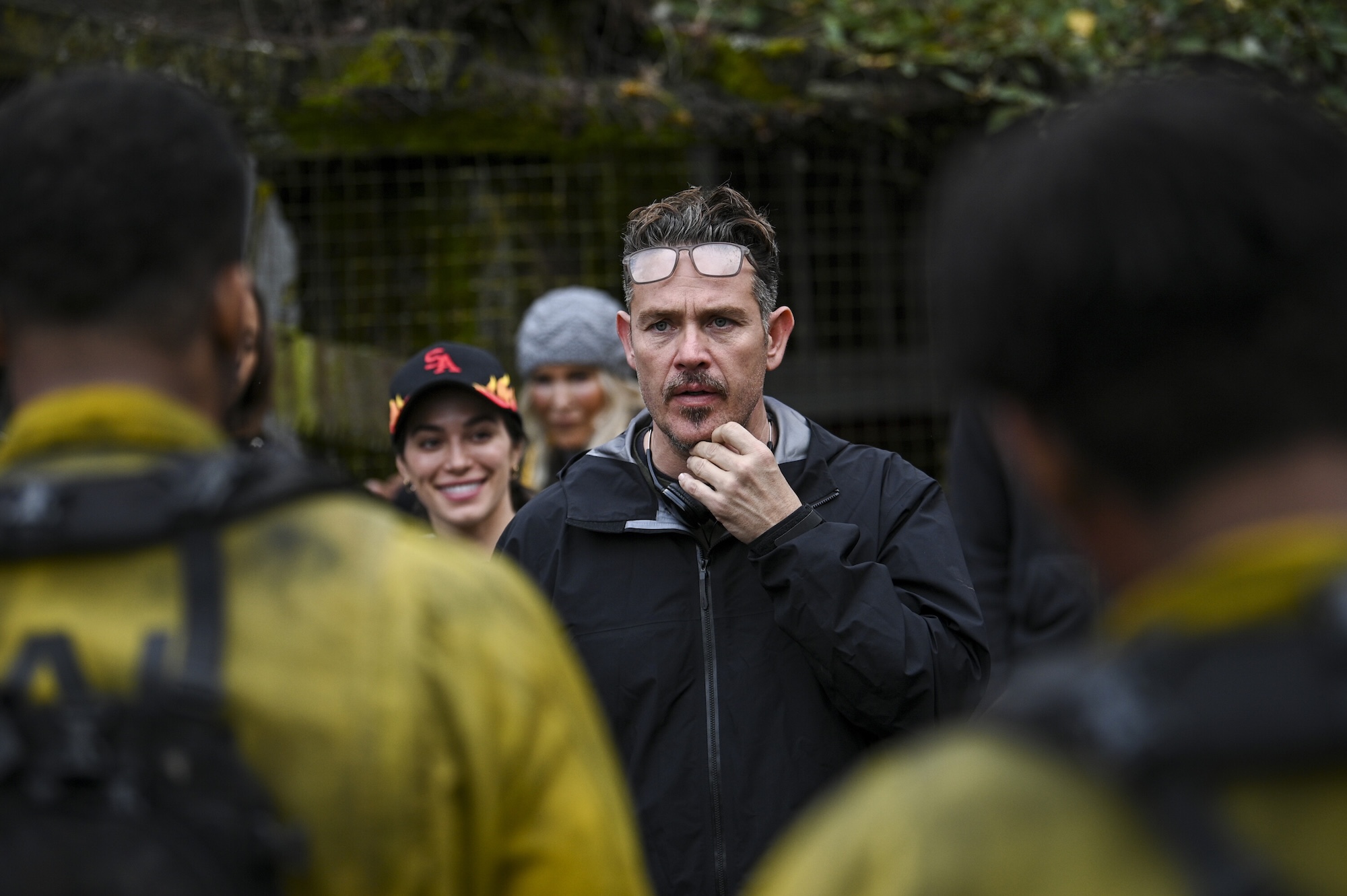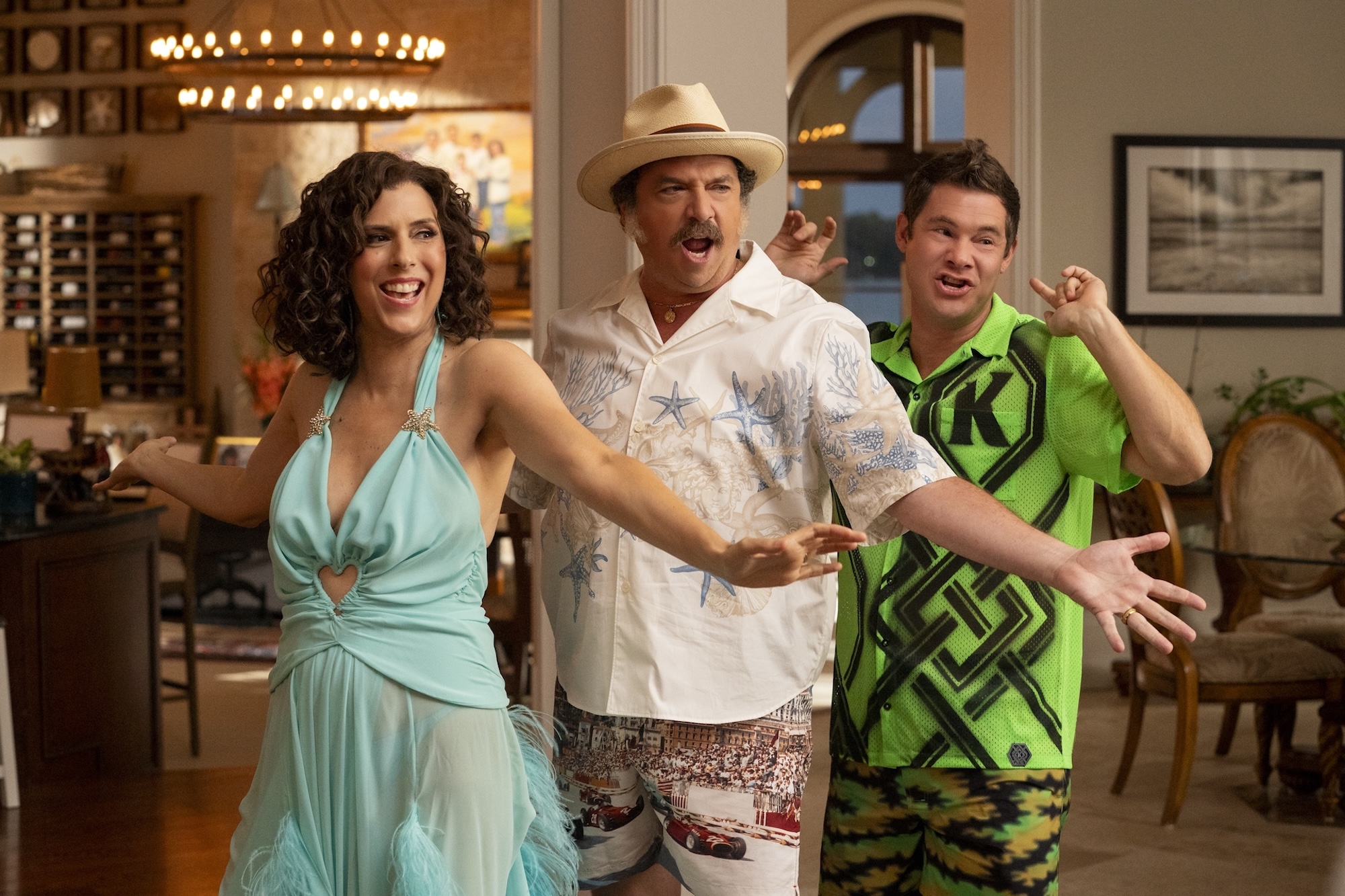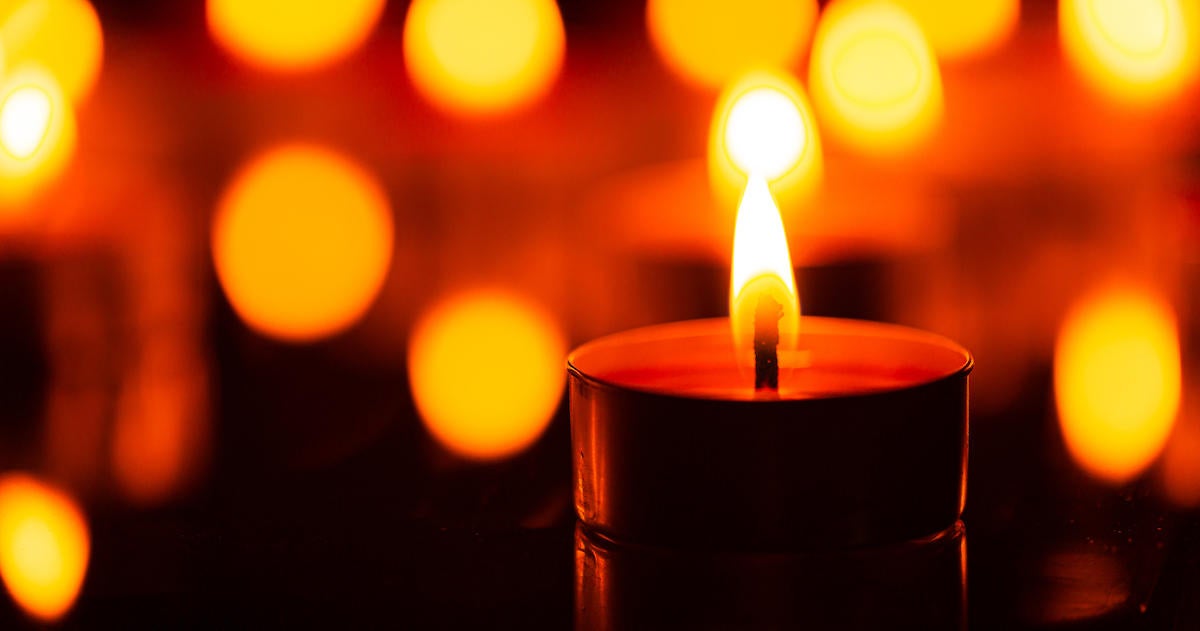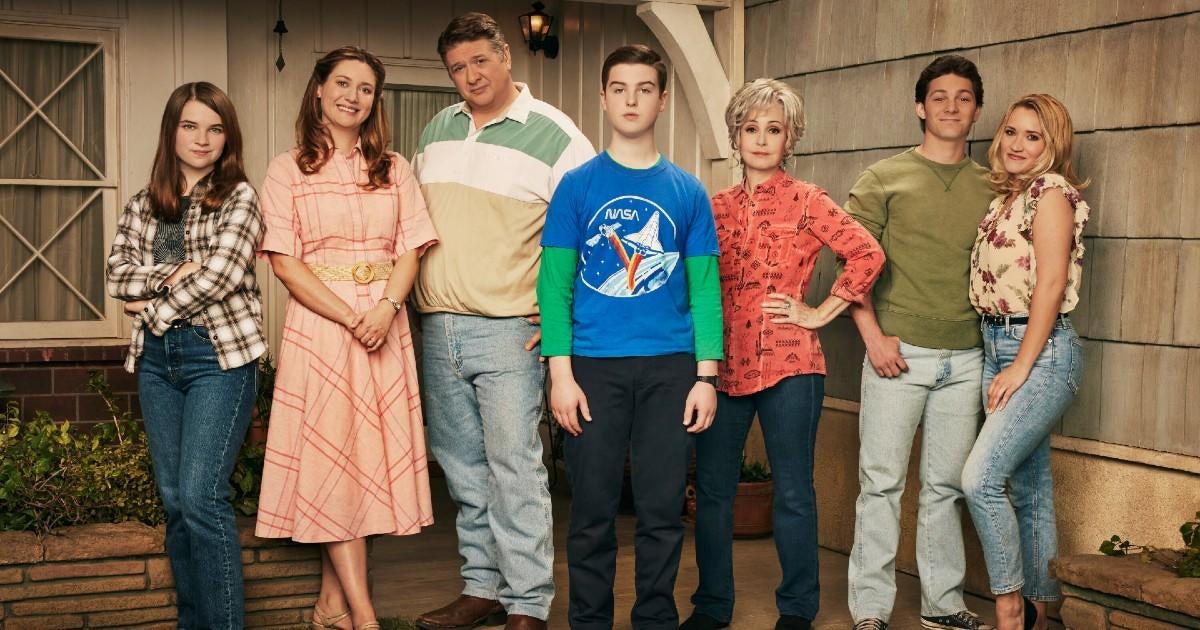Insecure’s Christina Elmore Navigated Motherhood Onscreen and Off
Christina Elmore is the actress, mother, wife, and friend we all need in our lives. You may know her as Condola in HBO’s Insecure, or Marie in BET’s Twenties; but she is also a Harvard graduate bravely walking the path she set out for herself at a young age, even if she didn’t always know that was what she was doing.
In the fifth and last season of Insecure, Elmore’s character embarks on the rollercoaster ride of new motherhood. Having just given birth to her own child weeks before filming, Elmore and Condola were simultaneously navigating sleepless nights and newborn cuddles, while also living very different lives.
Whether you love Condola for knowing what she wants, or hate her for arguably ruining the iconic relationship between Issa and Lawrence, you can’t deny that the woman who plays her is a positive force in and of herself. From the moment I hopped onto our Zoom call, speaking with Elmore felt like catching up with an old friend. Wearing an adorable black beret and luscious red lipstick, she shared how she feels about the last season of Insecure, her hopes for Black motherhood, and the necessary new standard of executive leadership in Hollywood.
How do you feel about this being the last season of Insecure? Do you think the story was wrapped up with a bow, or will we be left craving a little more from this world and these characters?
I feel bittersweet about its ending. I really loved the show as a fan of it at first. It’s one of my favorite shows as a viewer. So I’m pretty sad that I won’t have it on Sunday nights to watch anymore.
I’m also excited about all the things that so many of the people involved in creating it are going off to do. So I’m not concerned in that sense. I know there will be a lot of content on the way. Issa has a million projects in the works. I’m also excited to see what Jay [Ellis] and Yvonne [Orji] do. So many of the writers have incredible stories up their sleeves. They really set the stage nicely for a lot of amazing projects to be created. So, mostly I’m just sad as a fan.
As for the second part of your question, I wouldn’t say that the story is wrapped up with a bow. I’d say it’s wrapped up with gift wrap, and the bow was left off. I don’t know exactly how it ends because things were very secretive this year. But I think that while the story has concluded, we will see that the characters still live on in this world. We will see that they will be going on to do other things but we just won’t get to see it!
Your role this season deeply explores themes of motherhood, and the challenges of single motherhood. What was it like channeling the isolation and skepticism Condola felt about allowing Lawrence to be in their child’s life, when that might have looked different from how you are raising your own kids?
It was an interesting time to be playing Condola and to be shooting the role while she was in a very new postpartum state. I had just had a baby just a few weeks before I started shooting. So it felt like Condola and I were in this together. I was still healing in so many ways, physically, mentally, and emotionally. Even with the wonderful, amazing partner I have in my husband, I felt run ragged. I felt tired trying to work and being up in the middle of the night, and being worried about my children.
It was a whole other level for Condola to do that without a partner. She had to do it with a person who wants to be involved but on their own terms. It was really eye-opening because it’s hard to have a new baby no matter who you are or where you are in life, but I really had a dose of reality that I didn’t have to face in watching and experiencing Condola doing it without that partnership.
Also, Condola is very privileged! She has a beautiful home, she can afford to have maternity leave. She can pay for all sorts of things. But it still looks and seems and felt so hard. My heart goes out to single parents who are doing it all without the privilege Condola has. It really puts things in perspective for me. It made me appreciate the situation that I have. It gave me more empathy for all kinds of parents who are experiencing parenting differently.
Speaking of the challenges of motherhood, Black women, in particular, are more likely to face complications during pregnancy and childbirth than other demographics in America. What is your hope for the future of Black motherhood?
I have so many hopes for Black motherhood. I also have so many grievances. I really mourn for us in that we experience not only higher rates of maternal mortality, but also infant mortality. We experience harsher outcomes during our pregnancies including high blood pressure, gestational diabetes, thyroids, and more. There are so many barriers to us having healthy outcomes in pregnancy that when we do, it’s a miracle. I’m grateful that some of us have access to the healthcare we need to get through that, but I’m also reminded that so many of us don’t.
I’m saddened that in a country like ours, we are faced with so many barriers to us having healthy happy families and babies. But, I’m really heartened that I’m seeing activism, Instagram accounts, and blogs popping up all over the place where people are talking about things that our mothers and parents didn’t get to talk about even though they still faced them.
Now, it’s okay to talk about the thyroids we have, and it’s okay to talk about how we struggle with postpartum depression at higher rates. A lot of doctors don’t believe us when we say we are having a hard time and don’t hear our pain, so it’s great we even get to address postpartum depression.
We’re talking about it more and shows like Insecure are dealing with it in a beautiful way that shows it authentically. I am so grateful to be a part of telling that story. I hope there’s more of that to come.
Both you and Condola were in a postpartum state. In what other ways are you similar and in what ways are you different?
Condola really likes to be the adult in the room. She tries to make choices that are good for her, good for others; she is not messy. I’m like that too, so I hope we are similar in that way. But we are different in that Condola has a little less patience. She’s so good at making boundaries in her life that she has a little less patience for people who might mess that up.
That’s why when Lawrence [played by Jay Ellis] was struggling to get on the bandwagon with fatherhood, she’s like, “Listen, if you’re not gonna do it the way I want you to do it, then you can just be out!” Whereas I would be a little more like, “I mean, I guess you can just pick him up and bring him back later, I dunno!” I’m a bit more of a people pleaser in that way.
Even though Lawrence was saying he really wants to be a father, he had a long way to go to get there. He didn’t realize that motherhood is not just about rocking a baby in a beautiful bassinet. He didn’t realize how Condola’s body was literally changing. And Condola didn’t have time to be on his educational journey.
I actually admire Condola in that she’s like, “Look, I’m setting hard boundaries because this is my baby. This is the most important thing in my life. I told you that you can either be in or you can be out. But I can’t do this half-stepping.” I actually appreciate her candor and her hard boundaries because I might have a hard time putting them in place.
If Condola were your best friend, what advice would you give her?
Ha! I would say, “Girl, if he’s not gon’ do it, he’s not gon’ do it!” But you know what? I think I’d be wrong! Because at the end of episode 3, we see that he’s gon’ try to do it! I would also just say, “Let me come over and make you a meal.”
With new moms, we can act like we have all this advice. We can act like we can really help, but we can’t! All we can really do is cook her food, hold her baby while she naps, play, clean her house, and then help her figure out how she’s going to mother in the best way that will work for her. But I don’t think there’s a lot of advice you can give to other moms.
Insecure is directed by Black filmmakers, written by Black writers, and styled by Black costume designers. What is it like to be a part of a predominantly Black set telling Black stories compared to other projects you have been a part of?
It was the most incredible thing to walk on set and not just see how many Black people are on the crew, but also how many Black decision-makers there are! It starts at the top with Issa, but also the executive producers are women and people of color and Black people. So many of the department heads are Black. It’s not just Black crew, which in and of itself is a blessing; but really from the top to bottom you’re seeing a diversity of decision-makers. So when I walked onto set I didn’t have to worry about the department head in hair not knowing how to deal with it. Or some producer who is like, “I don’t understand…why does she want braids?” Things like that. It’s amazing. And what I also love is that it’s not just 100 percent Black. There are white people and Latino people and Asian people and so many people involved that make the world fuller in real life make this fictional world fuller as well.
The entertainment industry has emphasized diverse perspectives more than ever over this last year. What are some things you think the industry needs to change to make a more inclusive and supportive environment for historically marginalized artists?
I think that we need more Black studio execs, more Black, Brown, and Indigenous studio heads and presidents. People who are really saying yes and no. It’s wonderful when someone like Issa gets to make this incredible show on a network like HBO. But it would be even more wonderful if the person who was greenlighting it was also of color and was also a woman and was also someone who has an understanding of diverse perspectives. This way, we’re not just waiting for older white men to say yes to young Black creatives. This way, we’re opening the doors by being the gatekeepers ourselves. That also means not just making our own content, but doing things like what Macro is doing and creating our own content houses, so that we’re at the table from the start. I hope there’s more of that.
We can also bypass that system altogether. It is possible for us to create our own stuff and do not need a studio exec to say yes to you.
I’d love to know more about your journey. How did you know you wanted to become an actor, and what was the process of turning that dream into a reality?
I knew I wanted to be an actor since I was young. Growing up I played softball, I played the violin, and I did ballet. I eventually quit all of those things. But acting and doing plays and taking drama classes is something I never wanted to quit. By the time I was in high school I joined a young company in Sacramento called the Sacramento Theater Company. We got to do plays on their main stage and I got to work with adults who were real professional regional theater actors. That’s where I realized that this is a real job. I saw there are so many working-class actors who do all kinds of storytelling in theater and on our screens as their full-time job, and they’re not famous and not millionaires. I was like, “I’m into that!”
I went to college [at Harvard] and I knew even before college that I would go to graduate school for acting, and I did! I grew up in L.A. before Sacramento and I moved back to L.A. and I started auditioning. And it’s been a ride ever since! My path has looked different than I planned for it to. I thought I would be doing regional theater across the country. And it’s different because I’m mostly working in TV. As an actor who auditions for all my work, that’s just where I found myself. It worked for my family, and being in L.A. and not traveling worked for my kids. I’m happy to do it this way for as long as I can, then who knows what will happen after that!
You’ve previously spoken about the power of manifestation. Can you share how people can speak their dreams into existence as you did?
Well, I never thought of it as manifesting in my head. But when my last job as a regular on a show ended, my husband asked what I’m gonna do next. I was like, “Oh, I don’t know, just audition for things and see what comes!” He was like, “No! What would you do if you could do anything?” and I was like, “I’d like to do a half-hour comedy about Black women made by Black women for Black women.” And he was like “Okay, so that’s what you want to do!” But I was like, “Yes, but I probably won’t so that’s fine.” Then Insecure came, and after that Twenties came.
I don’t think I would even call it manifesting, as much as I think manifesting is wonderful and great. I think I prayed for something and God gave it to me. And I’m so grateful that he did. I think there’s power in speaking things into existence and claiming what it is we want.
Sometimes actors are pigeonholed, especially actors from historically marginalized backgrounds. Do you think we are seeing more characters, especially Black characters, acting in a way that better represents us?
Yes, that’s my favorite thing about Insecure: It’s about these two Black women friends who are regular, and ordinary and so authentic in their ordinariness. Not to say they’re not amazing women. They dress fabulously, they have so much brilliance. But the story is not about a superhero, it’s not about some sort of politician or Harriet Tubman or someone who is doing something exceptional. It’s about Black people doing something ordinary. And us getting a peek inside of the world of these two Black women in L.A., without having to have them be our magical saviors or be drug-addicted villains. I love that we see them as normal Black women. That’s why we all relate to them so well. It feels like my friends, it feels like your friends. I definitely want to see more stories like that. I’ve watched so many ordinary white people on TV my whole life, it’s nice that we’re seeing us too.
What is the most memorable behind-the-scenes moment from the set of Insecure?
I had a crazy experience auditioning for this job. My audition was the night before Condola’s role started working. I left the audition at 11:30 PM and got to work at 5:30 AM the next morning. So it was a little bit disorienting!
I had done a chemistry reading the night before with Jay Ellis. We met that night and he left before he knew who was booked for the role. But then I got to set the next day and we were about to start rehearsal for the first scene. I was like “Hi Jay!” and he was like, “Oh I’m sorry, have we met?” and I was like, “Last night! you know, we had a chemistry reading?” And he was like “I don’t recall. I’m so sorry. Nice to meet you.”
It turns out he was joking, but I didn’t realize it. I was like, “Oh my gosh! This is horrible! This is crazy! I was with him all night, how does he not remember?” I was all hurt. But then he was kidding! Those were the kind of shenanigans [we had on set]. But he is such a kind wonderful actor, so his joke, even though it set me off, it also immediately disarmed me so I was able to do the scene and feel at home and comfortable, and it’s been like this ever since. I’m grateful for Jay. I’m also thankful for all of them.
This interview has been edited and condensed for clarity.
This content is created and maintained by a third party, and imported onto this page to help users provide their email addresses. You may be able to find more information about this and similar content at piano.io

